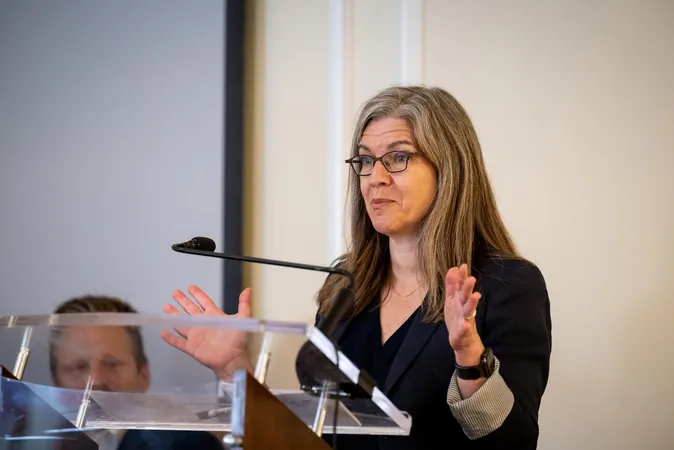
Revolutionizing Neurofibromatosis Research: The Impact of the Francis S. Collins Scholars Program
2025-07-15
Author: Yu
Battling Neurofibromatosis: A Genetic Challenge
Neurofibromatosis type 1 (NF1) is a genetic disorder that can cause debilitating tumors throughout the nervous system and lead to painful bone deformities. This common yet complex condition arises from a mutation in the NF1 gene located on chromosome 17, resulting in a broad spectrum of symptoms that can range from mild to severe.
A Transformative Initiative for Patients
For years, patients with NF1 faced overwhelming challenges in finding specialized care. Jaishri Blakeley, a neurology professor at Johns Hopkins University and director of the Neurofibromatosis Therapeutic Acceleration Program (NTAP), recognized this pressing issue. In 2014, she launched a groundbreaking initiative aimed at training clinician-scientists dedicated to enhancing NF1 care.
Celebrating a Decade of Progress
On June 20, the NF1 community came together to celebrate ten years since the inception of the Francis S. Collins Scholars Program in Neurofibromatosis Clinical and Translational Research. Named after the visionary who identified the NF1 gene, this program has cultivated a network of innovative clinician-scientists focused on collaboration and transparency.
During the anniversary event at Washington, D.C.'s Whittemore House, attendees discussed the program's successes while strategizing on how to navigate funding cuts to medical research.
Building a Community of Innovators
Blakeley emphasized the importance of creating a pipeline of dedicated clinician-scientists. "We seek outstanding individuals who are committed to both treating patients and conducting essential research that leads to faster, more effective treatments," she stated.
The program has made remarkable strides, contributing to critical advancements such as:
Achievements of the Collins Scholars
- New diagnostic techniques for early detection of NF1-linked cancers. - Innovative therapies for NF1-related tumors. - Insights into how NF1 affects brain development. - Securing over $85 million for subsequent research funding. - Publishing more than 60 peer-reviewed articles.
Empowering the Next Generation of Researchers
Every year, emerging clinician-scientists can apply for a fully funded three-year appointment in this prestigious program. To date, 18 scholars from around the globe—spanning specialties such as neurology, oncology, and genetics—have participated, enriching the NF1 research landscape.
Angela Hirbe, a former scholar and current director of the Adult Neurofibromatosis Clinical Program at Washington University, praised the program for accelerating her research and connecting her with a collaborative community dedicated to improving patient outcomes.
A Focus on Patient-Centric Solutions
The program’s success hinges on its commitment to addressing patient needs. Reviewers of research proposals prioritize projects that promise tangible benefits for patients, ensuring that work is not just academic but directly beneficial.
Blakeley noted that clinician-scientists bridge the gap between patient care and research, using firsthand experiences to tackle the specific challenges patients face.
Looking Ahead: The Future of NF1 Research
The 10th anniversary celebration featured presentations from 13 scholars, fostering collaboration and innovation within the community. "We're at a tipping point in basic science and drug development for NF1 and rare diseases," Blakeley remarked.
Moreover, findings pertaining to NF1 are increasingly relevant to more common cancers, as many cases of melanoma, sarcomas, and breast cancer involve alterations in the NF1 gene.
Avoiding Setbacks in Research Funding
As shifts in federal funding threaten to disrupt momentum, Blakeley remains optimistic. "We’re on the brink of groundbreaking advancements in NF1 research, and we must ensure that our dedicated scientists continue their vital work," she urged.
Thanks to generous contributions from organizations like Bloomberg Philanthropies, the Francis S. Collins Scholars Program aims to cultivate the next wave of innovations in NF1 research.


 Brasil (PT)
Brasil (PT)
 Canada (EN)
Canada (EN)
 Chile (ES)
Chile (ES)
 Česko (CS)
Česko (CS)
 대한민국 (KO)
대한민국 (KO)
 España (ES)
España (ES)
 France (FR)
France (FR)
 Hong Kong (EN)
Hong Kong (EN)
 Italia (IT)
Italia (IT)
 日本 (JA)
日本 (JA)
 Magyarország (HU)
Magyarország (HU)
 Norge (NO)
Norge (NO)
 Polska (PL)
Polska (PL)
 Schweiz (DE)
Schweiz (DE)
 Singapore (EN)
Singapore (EN)
 Sverige (SV)
Sverige (SV)
 Suomi (FI)
Suomi (FI)
 Türkiye (TR)
Türkiye (TR)
 الإمارات العربية المتحدة (AR)
الإمارات العربية المتحدة (AR)